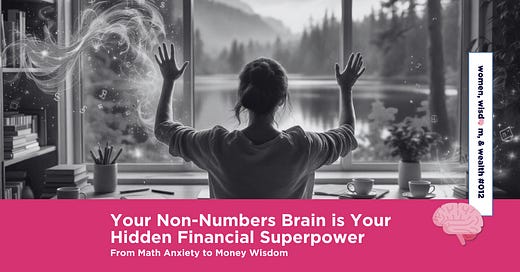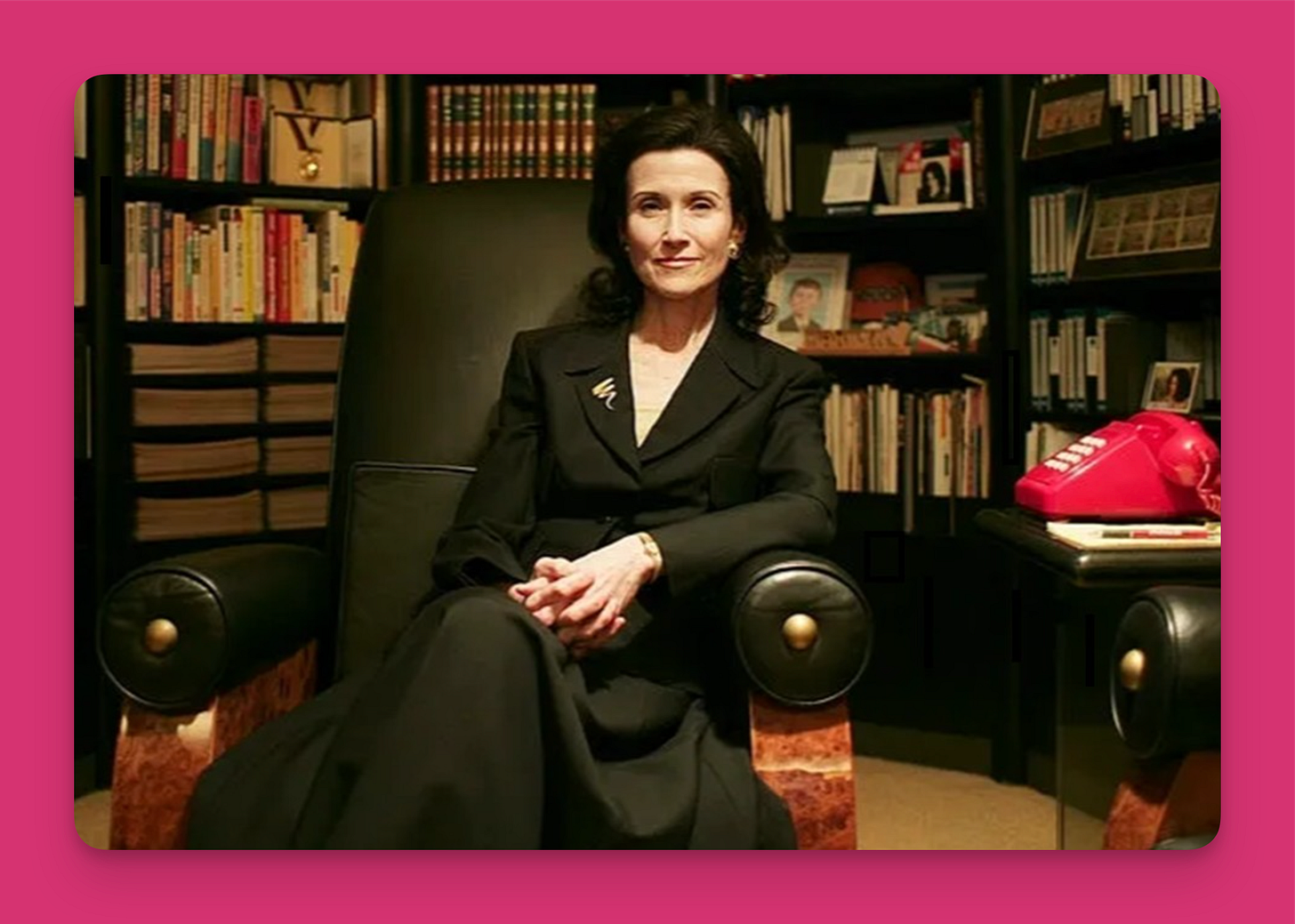When I was a little girl, there weren’t any subjects in school that I remember struggling with until I hit junior high (7th grade in the U.S. - 12-13 yrs old). It was a new school, and on the 3rd day of school, I was pulled out for unexpected hip surgery, so I missed the first three weeks of school.
I had a homeschool teacher come to the house, but I remember thinking she was kind of an odd duck. Suffice it to say, I felt like I was playing catch-up most of that year. Add to that the 5 months I spent on crutches while my hip healed, and well, let’s just say I don’t have fond memories of junior high (I had surgery on the other hip the following year).
From that point on, until I returned to complete my degree (at 38), I created a belief that “I’m not good at math.”
But by then, I had taught myself how to build WordPress websites and learned far more about using a computer than I ever thought possible. All of a sudden, I viewed math and numbers as simple: problem + formula = solution - even if what I was doing took longer to grasp.
However, that’s only one part of the equation (see what I did there? 😉).
👉Here's a truth I've been sitting with lately: What if everything we've been taught about being "good with money" is filtered through a masculine lens that doesn't honor the way many women naturally make their wisest decisions?
Think about it.
When was the last time you had a gut feeling about money that you ignored because it didn't seem "logical enough"?
Maybe it was an investment that looked perfect on paper but felt off
Or a pricing decision in your business that your spreadsheet said was "too high."
That inner knowing – the one society has taught us to doubt – might be your greatest financial superpower.
Let's bust a myth that's kept too many brilliant women playing small: the idea that you need to be a "numbers person" to be good with money.
This story has probably cost women more wealth than any bad investment ever could.
Because here's what nobody tells you: pattern recognition, emotional intelligence, and intuitive decision-making – skills many women have spent a lifetime honing – are sophisticated forms of financial intelligence.
Remember that friend who sensed something was off about that "amazing investment opportunity" before anyone else saw the red flags?
Or how about your ability to walk into a store and instantly know if the pricing matches the value (and since when did pajamas cost close to $100?!?! Some of these stores have lost their minds)?
That's not just random luck – it's your intuitive edge at work.
The irony?
We'll trust a random stock picker on TV (who's probably wrong as often as they're right) over our inner wisdom. We'll spend hours researching the "perfect" investment strategy instead of listening to what we already know deep down.
It's like having a financial GPS built into our souls but insisting on using someone else's outdated paper map.
But here's where it gets interesting: neuroscience is starting to catch up with what women have known in their bones forever. Our brains are literally wired for the kind of holistic, contextual thinking that creates sustainable wealth. While traditional financial planning often focuses on isolated numbers, women naturally consider the broader picture – how money moves and flows, how it affects relationships, and how it can serve the greater good.
So, how do we start reclaiming this intuitive edge?
First, we need to create space for that inner wisdom to speak.
This isn't about abandoning logic but bringing our full intelligence to the table. When facing a money decision, I've learned to step away from the spreadsheets and take a walk in nature. Sometimes, the clearest financial insights come when we're not thinking about money at all.
Start noticing when your body is trying to tell you something about your finances. When reviewing a budget, that tension in your shoulders might be telling you it's not aligned with your values. The excitement you feel about a potential investment might be your intuition recognizing an opportunity your logical mind has yet to grasp.
Most importantly, begin documenting these intuitive hits.
Keep a simple journal of your financial hunches and their outcomes. You might be surprised to discover you're far more financially savvy than you've given yourself credit for.
The truth is that the financial world needs more feminine wisdom, not less.
We need more women trusting their instincts, setting prices that feel aligned (even if they seem "too high" by someone else's standards), and making investment decisions that honor both the numbers and the knowing.
Your "non-numbers brain" isn't a liability – it's a sophisticated financial instrument that's been calibrating itself your entire life. Maybe it's time we started trusting it.
Next week, we'll explore how to take this reclaimed trust in our financial intuition and turn it into soul-aligned goals for 2025.
But for now, I invite you to sit with this question: What would change if you started treating your intuition as financial intelligence?
Trust your knowing. Your inner wisdom has been waiting for this moment.
Women You Should Know
Marilyn Vos Savant - Highest Recorded IQ
Marilyn Vos Savant holds the highest recorded IQ ever—an astounding 228—surpassing the likes of Einstein and Hawking. Yet her brilliance became a source of ridicule when she answered the now-famous Monty Hall Problem in her Parade Magazine column, claiming contestants should switch doors to improve their odds of winning. Over 10,000 readers, including PhDs, called her wrong—but she wasn’t. Her logic was later proven correct through computer simulations and experiments, exposing how often intuition fails us. Marilyn’s story highlights her extraordinary mind and the struggle against societal bias and the power of independent thinking.
You Don’t Need A Budget:
Stop Worrying about Debt, Spend without Shame, and Manage Money with Ease
By Dana Miranda
(She’s on the list to interview for the podcast, which will launch in January!)
Pre-order now!
I pre-ordered this book and am excited to dive into it the week between Christmas and New Year’s (it comes out on December 24th). This might seem contrary to my testing of the YNAB software, but I think this is much more up my alley. I also like Ramit Sethi’s idea of a “conscious spending plan.”
A Few Of My Favorite Things 🎶
I thought it only made sense to include a few other newsletters I subscribe to that align with my mission of financially empowering women.
is Dana Miranda’s newsletter. “Money talk for misfits” (love that!). from & - Talking about money, motherhood, careers, and all that good stuff. From the founding editor of Refinery29 Money Diaries. - A thoughtful look at culture, politics, economics, and lifestyles through the lens of income inequality.Can You Imagine? 🤣
It’s really true what they say about getting older and time moving faster.
On the one hand, it feels like it was just July; on the other hand, this year feels like it’s been a lifetime (or has that been the last few years?).
Regardless, my priority for these last few weeks of December is simple: remain present. Being present is always the goal, but especially at this time of year when we can feel pressure to do “all the things.”
Staying present is a gift you give yourself. 🎁
I hope you find joy in the little moments as we wind down the year.
Have a wonderful day,
Kim









Yes and no.
Intuition is powerful and I've used it.
But delusion is powerful as well.
I've gone with intuition and had it pay off. I've ignored it and been proved wrong.
But I've also gone with it and been proved wrong.
Those times are easier to skip over mentally and that's the hidden mine.
My trick is to remember that it's a tool which is only as good as you are at interpreting it.
On the flip side, how many people confuse desire with intuition? Because I have known multiple people who assured me the lottery/slots/start up is going to hit big and they're going to be rich beyond my wildest dreams.
They told me that when I met them and they told me that at their retirement party. And nothing happened in between. (Lottery.) Or they told me that when they hired me and they were still waiting for it at the fire sale. (Start up).
Do your research. Run your spreadsheets. Then take the walk.
Don't bet this month's rent.